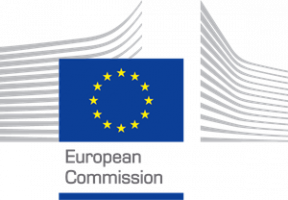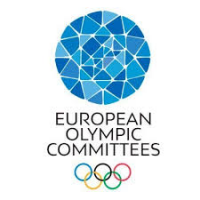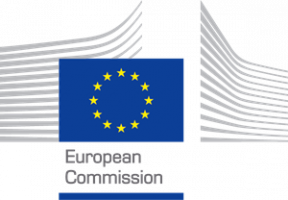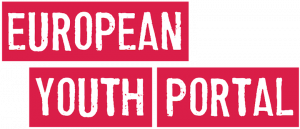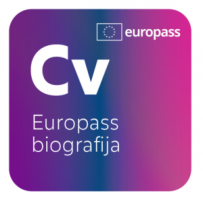About Sector
Numerous
institutions of the European Union deal with improving the position of young
people, which strive to involve young people directly in decision-making at the
EU level. Through youth policy, the European Union encourages the participation
of young people in democratic life, supports the social engagement of young people
and strives to ensure that all young people have the necessary resources at
their disposal for active participation in society.
The EU Youth Strategy is a framework for cooperation in the field of youth policy for the
period 2019-2027. Eleven European goals for improving the position of young
people reflect the views of European youth and define strategic priorities for
all member countries: mental health and well-being of young people, support for
young people in rural areas, quality employment for all, quality learning,
connecting the EU with young people, equality of all genders, inclusive
society, information and constructive dialogue, space for all and participation
of all, sustainable green Europe, youth organisations and European programmes.
The European Union financially supports Serbia's
efforts to improve youth policy in the
aforementioned areas through projects aimed at youth organisations and relevant
institutions. Projects for youth financed by the EU contribute to the overall
readiness of institutions at the national and local level for innovative
development and active involvement of young people, establishing better
cooperation between institutions and with young people, so that they can better
respond to the needs of young people, and increase the scope and quality of
services for young. Additional support was provided to line ministries in order
to support the improvement of employment policy and active inclusion of young
people.
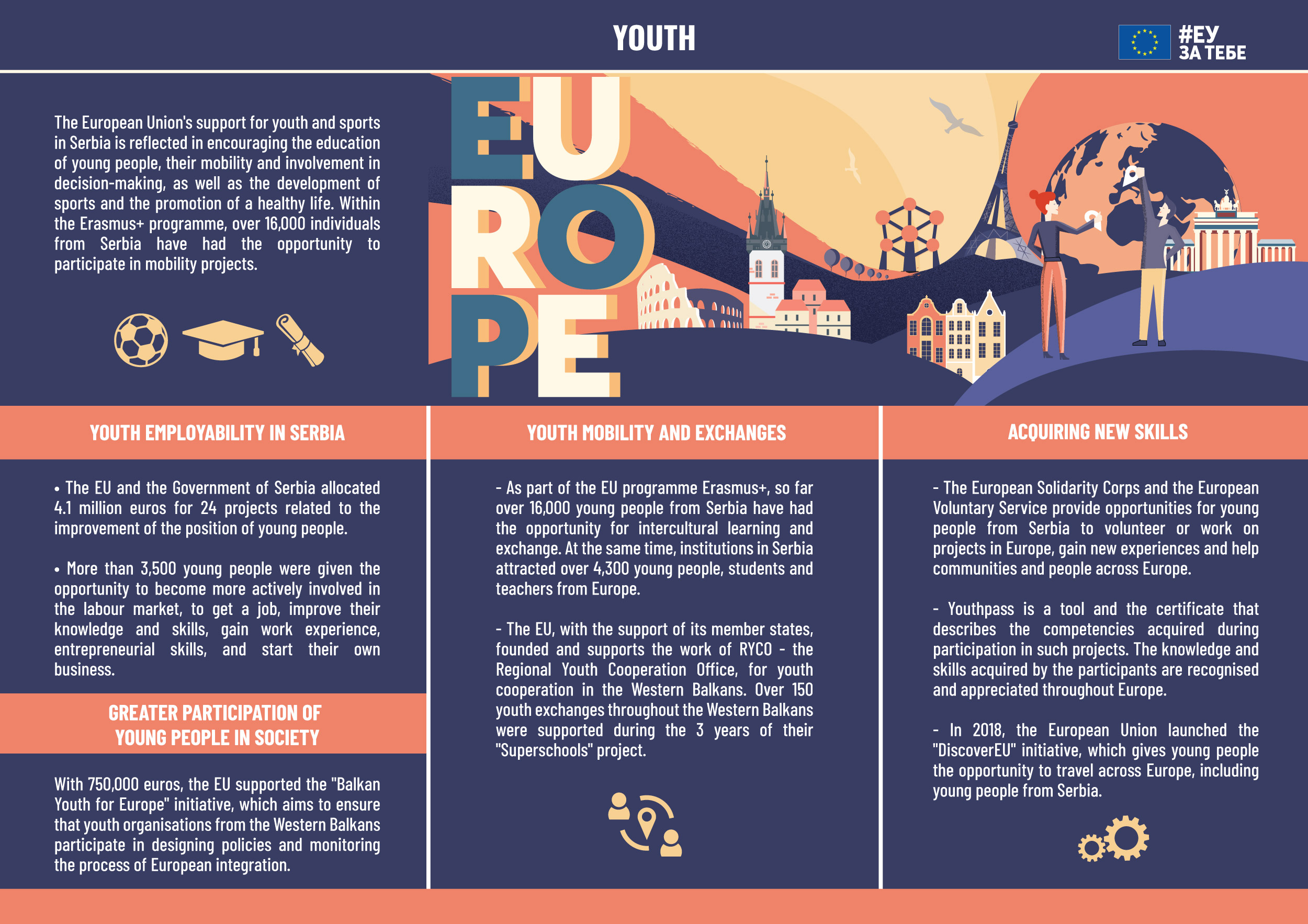
EU for youth employability in Serbia
With the project
"Support of the European Union
to the Active Involvement of Young People", the European Union and
the Government of the Republic of Serbia allocated 4.1 million euros for 24
projects related to the improvement of the position of young people. More than
3,500 young people were given the chance to become more actively involved in
the labour market, to get a job, improve their knowledge and skills, gain work
experience, entrepreneurial skills, and start their own business. There is a
special focus on young people who join the labour market with more difficulties,
such as young people without qualifications or insufficiently qualified, young
people without employment and from particularly sensitive social groups (youth
with disabilities, developmental disabilities, Roma, young people from rural
areas, etc.), young people who have not been educated or who have not received
any training or course, young people who are beneficiaries of social assistance
or who are long-term unemployed.
With over 830,000 euros of the EU support, through the
WeB4YES project (Western Balkan Civil Society Organisations for Youth Employment
Support), a new e-platform was created that will
enable young unemployed citizens from the Western Balkan countries to get
information about the labour market in their own and other countries, available
workplaces, to learn more about the steps in career development, get online
career counselling and get relevant information about active labour market
measures for unemployed youth, internship opportunities, business incubators,
subsidies and other incentives for starting a business, special incentives for
the employment of young people with disability, etc. Also, 18 small civil society
organisations from the Western Balkans received grants in the total amount of
150,000 euros for the activities in the fight against youth unemployment. The
EU provided over 1.1 million euros for the development of student company
models, the promotion of youth employability and entrepreneurship, through the BY
LEAP Project.
"My Career from Zero to Hero" is a regional project, the aim of which is to improve the employability of disadvantaged youth who are not in education or training or in the labour market (NEET). The project primarily focuses on the development of transferable skills and digital (IT) skills, as well as an introduction to entrepreneurship. The EMPLOYOUTH Project deals with the same group of young people, which provides financial support for 50 youth organisations for the implementation of the youth employment model from the NEET category. The European Union finances both projects in the total amount of 2.1 million euros.
The EU for greater participation of young people in society
With 750,000 euros, the EU supported the "Balkan Youth for Europe" initiative, which aims to ensure that youth organisations from the Western Balkans participate in designing policies and monitoring the process of European integration. Through the Western Balkans Youth Lab Project, funded by the EU with 1.5 million euros, a longer-term structured regional dialogue between youth organisations and state administrations will be formed, aimed at jointly designing policies that will increase the participation of young people in decision-making in order to improve the overall socio-economic environment and youth mobility in the economies of the Western Balkans.
The EU for acquiring new skills
The European Solidarity Corps and the European Voluntary
Service provide opportunities for young people from Serbia to volunteer or
work on projects in Europe, gain new experiences and help communities and
people across Europe. Also, organisations and institutions from Serbia can
receive help from volunteers from Europe. Youthpass is the recognition
tool that describes the competencies acquired during participation in such
projects. The knowledge and skills acquired by the participants are recognised
and appreciated throughout Europe.
In 2018, the
European Union launched the "DiscoverEU" initiative, which offers
young people the opportunity to travel throughout Europe. The EU launched the
initiative in order to encourage learning about cultures, the history of
European civilisation, but also to explore the identity of the EU. It is enough
to be 18 years old and a citizen of one of the EU member states in order to
apply for the competition and get a free InterRail ticket - an InterRail Pass.
In the past year, more than 50,000 young people across the EU received
InterRail Passes and travelled across Europe.
The EU for youth mobility and exchanges
Serbia
participates in the largest European programme in the field of
youth, sports and education - Erasmus+, and since 2019 as a full
member of the programme. The total funds allocated to the Erasmus+ Programme
amount to 14.7 billion euros. With the support of the European Union, young
people, athletes and students from Serbia participate equally with their
colleagues from the EU in exchange and training projects. So far, over 16,000
young people from Serbia have had the opportunity for intercultural learning
and exchange. At the same time, the institutions in Serbia have attracted over
4,300 young people, students and teachers from Europe. Since the beginning of
this programme, Serbia has been the leading country in the region in terms of
the number of approved funding projects and the number of participants in
mobility projects.
Youth exchanges help us understand each other better. Guided by this, the European Union, with the support of its member states, founded and supports the work of RYCO - The Regional Youth Cooperation Office for youth cooperation in the Western Balkans. Every year, RYCO, with the support of the EU, issues calls for proposals for regional youth exchange projects.
The Superschools programme aims to support peace-building and reconciliation processes, as well as intercultural learning and dialogue between schools, students and their communities in the Western Balkans. Selected secondary schools have the opportunity to conduct two exchanges with a partner school from the region, as well as to participate in the activities dedicated to capacity building, networking and cooperation. During the three years of the programme, more than 150 youth exchanges were supported throughout the Western Balkans.
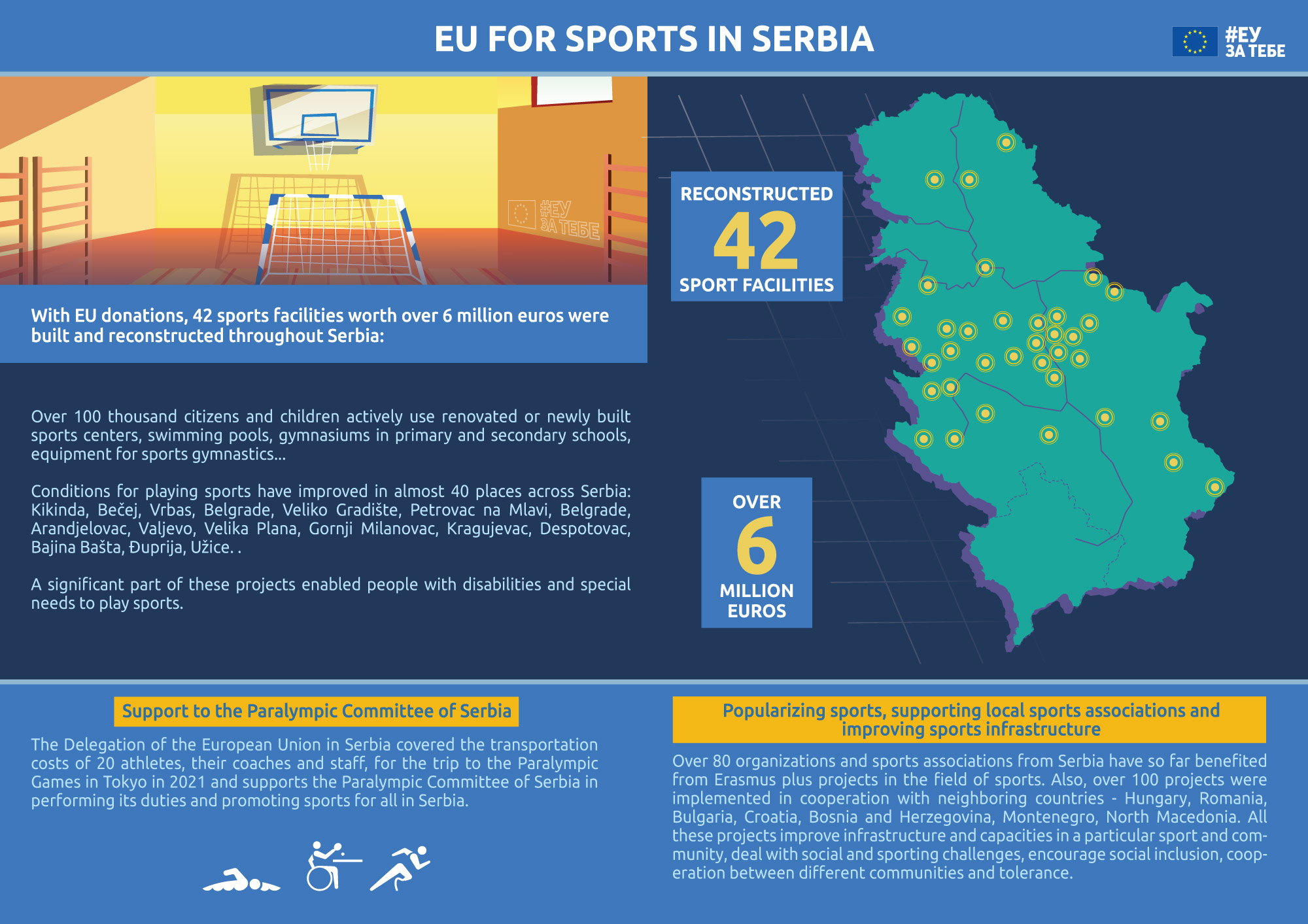
Find out more
List of key local partners/organisations
- Ministry of European Integration
- Ministry of Finance
- Ministry of Youth and Sport
- Ministry of Education, Science and Technological Development
- Ministry of Labor, Employment, Social Affairs and Veterans Affairs
The European Union's support for youth and sports in Serbia is reflected in encouraging the education of young people, their mobility and involvement in decision-making, as well as the development of sports and the promotion of a healthy life. Within the Erasmus+ Programme, over 16,000 individuals from Serbia have had the opportunity to participate in mobility projects. Also, Serbia actively participates in the organisation of the European Week of Sports.
The EU recognises the importance of education and employment of young people who are the pillars of the European future. Through supporting sports and sponsoring sports initiatives, the EU seeks to build the cohesion of the European community, ensure greater social inclusion and promote a healthy lifestyle.

